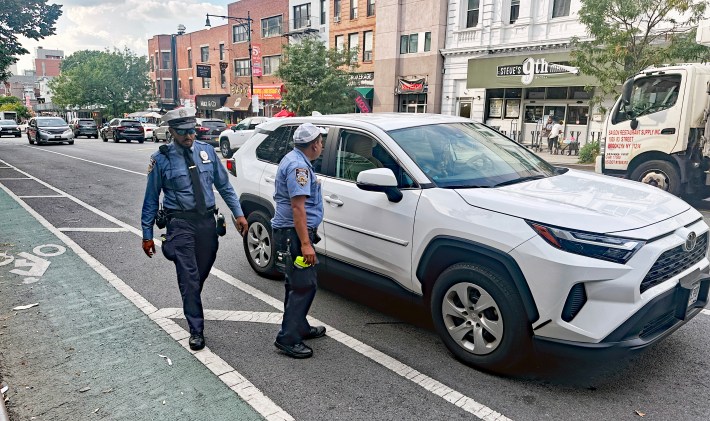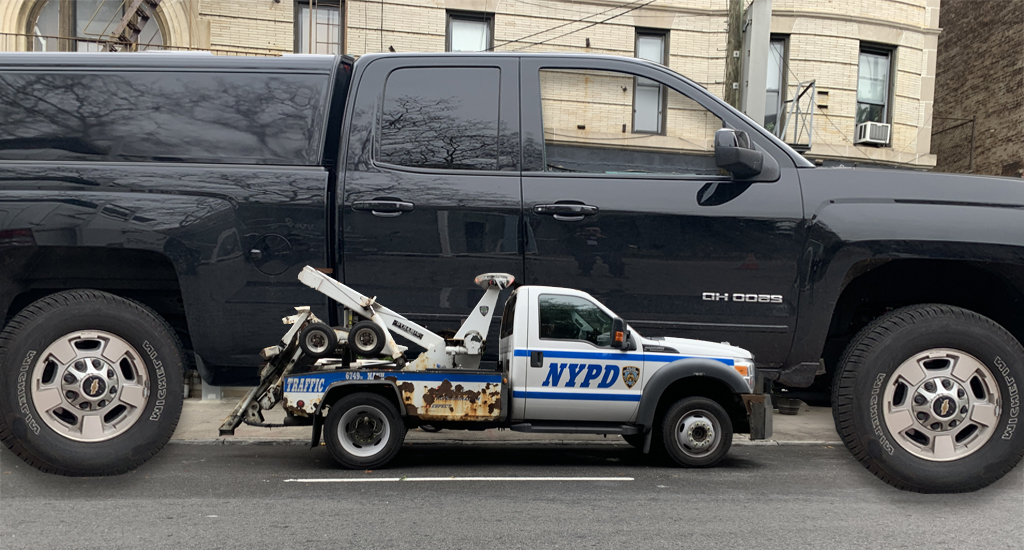One database doesn't know what the other database is doing!
On any given day, hundreds of vehicles that are eligible to be towed away for unpaid parking tickets receive yet another orange badge of dishonor on the windshield from a city enforcement officer — yet the car remains on the street, a new data analysis reveals.
Nearly 5,000 towable cars were, in fact, not towed away over a recent 90-day period, even after receiving more tickets, according to the analysis of city data by parking and police accountability advocate Justin Sherwood.
"There seems to be no reasoning behind [this]," Sherwood said of the city's towing efforts.
A vehicle can be towed if its driver fails to pay or dispute tickets of $350 or more within about 100 days — the point at which the city considers those violations "in judgment."
But here's the catch: NYPD traffic enforcement agents, who give tickets, don't connect to the "in judgment" database — so they keep on writing tickets to thousands of cars that should already be towed.
"There’s a disconnect," said "Gridlock" Sam Schwartz, the city's former traffic commissioner under then Mayor Ed Koch in the 1980s.
The disconnect means that 4,817 cars that got a ticket by the NYPD within the 90-day period in Sherwood's review already had enough tickets in judgment to get towed.
Some offenders rack up tens of thousands of dollars and continue to get fines – often within the same area – but get to keep their cars. The city could at the very least tell officers at local police precincts to keep a look out for those high-judgment license plates and check locations where drivers have been caught repeatedly, according to Schwartz.
"Certainly a top 10 list, or everybody over $30,000, would be the way I would start," Schwartz said. "You could have someone study where all those tickets are, they’re probably all clustered."
Who tows whom when?
There are three groups of towers in the city:
- The NYPD's Traffic Enforcement District focuses on keeping motor vehicles flowing and turning over curbside parking spaces
- The Department of Finance, which runs the main towing program via the Sheriff's Office, who targets vehicles with unpaid fines.
- City marshals, who also target scofflaws for unpaid fines.
The marshals, 83 private citizens appointed by the mayor to enforce Civil Court orders like towing and evictions, get a 5-percent cut of collections, along with a set of fees set by the state.
The Department of Finance has more than a dozen teams "rotating" across the city that typically boot vehicles and tow them if the driver doesn't pay their fines within 48 hours, said agency spokesperson Ryan Lavis.
The agency has some impressive numbers: between July 1, 2024 and June 30, 2025, its teams booted 176,677 cars and towed away 48,704, netting more than $126.5 million. In the prior 12 months, the workers, clamped 144,254 cars and removed 42,917, which brought in just below $109 million, Lavis said.
Of course, the agency sometimes struggles to find a car, especially if its owner doesn't park it on the street or goes out of town a lot.
"It can be difficult to determine where a vehicle is parked, especially if it is in a private driveway, garage, out-of-state, or otherwise outside our jurisdiction, which limits enforcement in certain cases," Lavis said in a statement.
Missed opportunities
How is it possible that NYPD Traffic Enforcement Agents can spot an illegally parked car that is already on a list to be towed yet simply slap another ticket on its windshield and walk away?
Therein lies a story of New York.
In the 1990s, then-Mayor Rudy Giuliani broke up the Transportation Department by moving its traffic agents into the NYPD, and shifting the scandal-scarred Parking Violations Bureau to the Department of Finance.

Schwartz said this split was a "huge mistake," and continues to divide the city's efforts to keep the streets safe and remove repeat scofflaws off the road.
"I believe it was a huge mistake when Giuliani put all the traffic agents under the Police Department," he said. "They were designed to implement the policies of the DOT, not the Police Department."
The Police Department's more than 2,800 traffic agents don't have access to "scofflaw data," an NYPD spokesperson said in an email. When asked about a scenario under which traffic agents would look up to see if a car in question was "in judgment," the NYPD spokesperson referred the question to the Department of Finance.
A former traffic enforcement agent, who asked to speak anonymously, said that upper management at NYPD's Traffic department does have a list of repeat offenders, but only for people who break parking rules at the same spot repeatedly.
That list ensures that ticketing agents don't bulk up their numbers by going after a handful of recidivists over and over again.
"It’s an integrity thing, because some of the smarter or more observant agents realize the car’s not moving and keep giving tickets to the car to make it look like they’re productive," the former traffic cop told Streetsblog. "That’s the Traffic version of acting like they’re doing work when they’re not."
Ticketing agents are supposed to call in a car for towing if it racks up three tickets at the same location, or if there's a "quality of life" issue, such as a car blocking a hydrant, bike lane or bus lane, the former TEA worker said.
A leader of the union representing traffic agents said the city lacks the resources to go after all the towable vehicles.
"Right now, we don’t have enough agents that are doing the towing," said
Sokunbi Olufemi, vice president of Communications Workers of America's Local 1182. "NYPD doesn't have enough agents and they don’t have enough vehicles."
Olufemi suggested the police set up a specific squad to target vehicles in judgment, along with abandoned cars. The NYPD has done one-off blitzes going after derelict vehicles, most recently with Commissioner Jessica Tisch's efforts to focus on so-called "quality-of-life" offenses.
"There’s a lack of continuous communication," he said. "That should be a special squad that would be doing that."
Money on the table

The roughly 4,800 motorists who could have been towed yet got just another ticket instead owe a combined $16 million to the city. A whopping 240 drivers are due to pony up more $10,000, according to Sherwood's analysis of the data, meaning they are living in the very same "consequence-free environment," that Tisch claims bike riders inhabit.
And these scofflaw drivers are the worst of the worst.
The highest violator owes the city a whopping $114,000 on 913 tickets, all of them in the NYPD's 109th Precinct in Flushing, Queens. The runner-up with 823 tickets and more than $95,000 in debt was caught mostly in uptown Manhattan precincts.
The city could tell officers at local police stations to keep a look out license plates on the cars with the most in-judgment tickets — because, after all, the city's own data shows where such cars are being nabbed most frequently.
"With all the tools available they should really be booting the highest value ones," Sherwood said. "Anyone with access to Open Data could run that report, so it’s kinda odd that a traffic agent with their phone couldn’t run that information."






